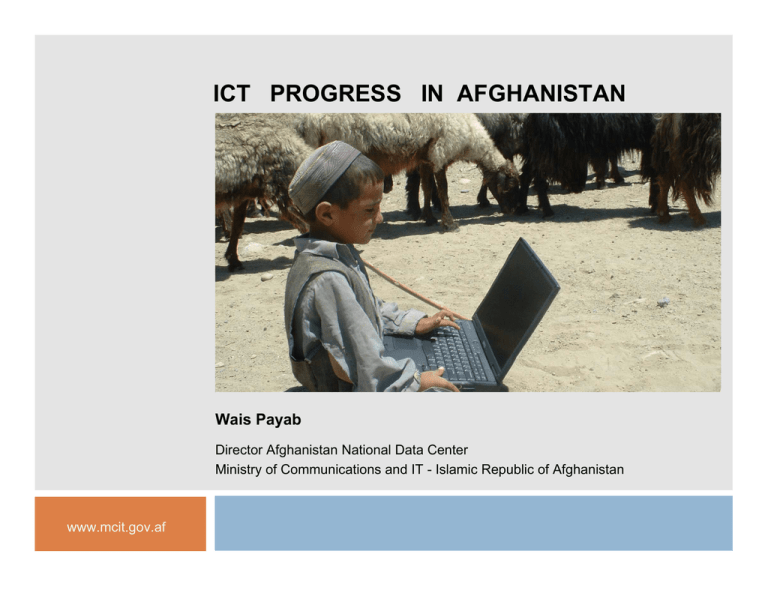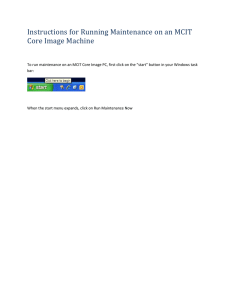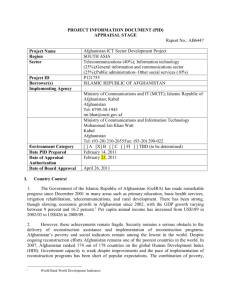ICT PROGRESS IN AFGHANISTAN Wais Payab
advertisement

ICT PROGRESS IN AFGHANISTAN Wais Payab Director Afghanistan National Data Center Ministry of Communications and IT - Islamic Republic of Afghanistan www.mcit.gov.af FLASH BACK (BEFORE 2001) 2 Less than 15,000 local landlines in the country No international calling facility - Pakistan country code used in many border areas in 2000. Thus Afghans had to travel to neighboring countries to make or receive international phone calls No internet connectivity and ISPs in the country No ICT Institutions and Companies www.mcit.gov.af FLASH BACK (BEFORE 2001) 3 Computer Technology was introduced in 1973 by establishing “Afghan Computer Center”, the main functions of the centre were: Keeping records of foreign trade Maintaining updated information of pension beneficiaries Issuing bills for utilities Operating a database for the central bank Maintaining a statistical database Managing the ticketing and reservations system for ARIANA Airways www.mcit.gov.af AFGHANISTAN TODAY - POLICIES & REGULATIONS 4 MCIT is playing a lead role in the promotion of ICT within the country and has key and remarkable achievements in the field of ICT since 2001; Developed ICT Policy (2003) Developed Telecom Policy (2003) Developed Telecom Law (2005) Established ATRA - Afghanistan Telecom Regulatory Authority - (2006) Developed ICT Law (submitted to parliament 2009) Developed E-GIF – E-Gov Interoperability Framework – (2009) www.mcit.gov.af AFGHANISTAN TODAY - POLICIES & REGULATIONS 5 The MCIT became a Policy Maker rather then Service provider and opened the Telecom market for the private investors, as a result; Established Afghan Telecom - a Fixed Telecom Operator (CDMA) - (2005) Issued 3 LFSP - Local Fix Line Service Provider - licenses (2005/2006) 4 GSM Companies are operating in the country (2002, 2005/2006) 20 Internet Service Providers 30 IT Solution Providers 7 Postal Services Providers Over 500 IT Companies Establishment of Afghan Post (2010) www.mcit.gov.af COMMUNICATION COVERAGE 6 A total of 1.3 billion USD has been invested in the ICT sector and as a result of that today; Over 80% of the country has phone coverage More then 9.5 million Afghans - 32% of the population have access to mobile phones and landlines The price of a SIM Card was 300 USD in 2002 and today it’s almost free The price of each minute local call was 0.4 USD in 2002. Today, as a result of strong competitive market the local call rates are up to 0.02 USD/min. The price of each minute of an International call has also decreased from 2 USD/min up to 0.1 USD/min and is still falling www.mcit.gov.af EMPLOYMENT OPPORTUNITIES 7 A total of 75,000 job opportunities have been created with the development of ICT. Today, 10 thousand Afghans are working for five communications companies, 20 Internet Service Providers and hundreds of middle and minor communications companies. The remaining 65,000 people are employed indirectly as contractors, vendors and so on. www.mcit.gov.af REGIONAL PROSPECT (NATIONAL OPTICAL FIBER NETWORK) 8 A 3600 KM National Optical Fibre Network is being laid along the national highways of Afghanistan in the form of a ring. Afghanistan is already connected to Tajikistan, Iran and Pakistan and to the other international optical fiber routes such as TAE, SEWEME. This Network will link central Asia and southern Asian countries. www.mcit.gov.af FUTURE PROJECTS: 5 YEARS PLAN 9 Program Enabling Environment Projects 2009 2010 2011 - Electronic Certification Authority x x - Chief Information Officer Structure x x - NIRA (National Internet Registry of Afghanistan) x x x x x - ICT Training Centers x x x - ICT Institute x x x - AfCERT (Afghanistan Cyber Emergency Response Team) Literacy www.mcit.gov.af FUTURE PROJECTS: 5 YEARS PLAN 10 Program Infrastructure Projects 2009 2010 - National Data Centre x - Disaster recovery centre and its associated access networks - Secure Data Communications and Access networks x 2011 2012 x x x x x - Internet Exchange Point x x - Digital Signature Infrastructure x x - ICT Village x x x www.mcit.gov.af FUTURE PROJECTS: 5 YEARS PLAN 11 Program Projects 2009 2010 - E-Gov Strategic mater Plan x E-Afghanistan 2012 2013 x x - E-Gov Resource center - Interactive Web Portals 201 1 x x x - National ID Cards x - E-Land Titling - E-Document Management System x x - E-HR Management System x x x x x x x x www.mcit.gov.af AF-CERT 12 MCIT has focused on the establishment of physical ICT infrastructure in the country, now it is sifting its focus to the information layer. In order to bring in e-applications and make use of the already laid-down infrastructure it is quite important to have the related Cyber Security institutions, tools, regulations and infrastructure in place. In this regard MCIT has taken the initiative to establish AfCERT; The Unit has been established Staff hiring has started ICT law has dedicated chapters for cyber crimes Joined the ITU-IMPACT Collaboration www.mcit.gov.af AF-CERT 13 ITU has commitment to send 2 experts towards the end of 2009 to Kabul, to start drafting; mechanism for the operation of the AfCERT needed SOPs for AfCERT policies how AfCERT will interact the Chief Security Officers in other ministries and organizations in Afghanistan ToR of the Chief Security Officers essential documentation for affiliation of AfCERT with other international CERTs essential documentation which will clearly mention the focused areas for AfCERT to operate e.g. SPAM, Intrusion Detection, Hacking etc Training for the staff www.mcit.gov.af THANK YOU! wais.payab@mcit.gov.af www.mcit.gov.af



